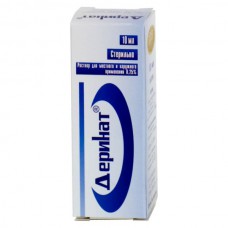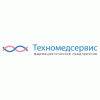Expiration date: 02/2026
The composition and form of issue:
Solution for local and external application of 0.25%, 1 ml contains:
sodium desoxyribonucleate 2.5 mg
auxiliary substances: sodium chloride 1 g water for injection 1000 ml
in vials-droppers or bottles of dark (neutral) glass of 10 ml box of 1 bottle.
Solution for injection for intramuscular injection 15 mg/ml, 100ml contains:
sodium desoxyribonucleate 1.5 g
auxiliary substances: sodium chloride 0.9 g water for injection 100 ml
in vials of 5 ml box of 5 bottles.
Description pharmaceutical form:
Solution. Transparent colorless liquid without foreign inclusions.
Pharmacokinetics:
Absorption and distribution
Has a high affinity to the organs of the hematopoietic system, actively participates in cellular metabolism, being added in the cell structure. A phase of intensive income of the drug in the blood is redistributed between the plasma and the formed elements of the blood, in parallel with metabolism and excretion. After a single injection for all pharmacokinetic curves describing the change of drug concentration in the studied organs and tissues, characterized by rapid increase phase and a fast phase of decrease of concentration in the time interval 5-24 h. Cmax of the drug in the brain is achieved after 30 min.
Metabolism and excretion
Derinat is metabolized in the body. Excreted from organism (as metabolites) partially with faeces, and to a greater extent urine in bieksponencialny dependence.
Description pharmacological action:
The drug has a modulating effect on cellular and humoral components of the immune system and nonspecific resistance of the organism, optimizing the inflammatory response and the specific immune response to bacterial, viral and fungal antigens. Immunomodulatory effect Derinat due to its ability to stimulate b-lymphocytes to activate T-helper cells and cells of the monocyte-macrophage system. The drug speeds up energy metabolism within the cells, synthesis of RNA and DNA. Activation of cellular immunity But increases the ability of natural killer cells to affect cells affected by viruses, chlamydia, Staphylococcus aureus, Escherichia coli, Helicobacter etc. Derinat stimulates reparative and regenerative processes. The drug has anti-inflammatory, antitumor, antiallergic and detoxifying effect and also antioxidant and membrane stabilizing properties. But normalizes body dystrophy vascular origin, providing poorly marked anticoagulant effect.
Derinat helps to remove the body of free radicals, reduces the sensitivity of cells to damaging action of chemotherapeutic agents.
In the body, the drug accumulates mainly in organs of the immune system and hematopoiesis — bone marrow, spleen, lymph nodes and in the intestinal epithelium.
Increases the body's resistance to infections. Stimulates disorders (normalizes the number of leukocytes, lymphocytes, granulocytes, phagocytes, platelets).
Having expressed lymphotropic, Derinat stimulates drainage and detoxification function of the lymphatic system. Derinat significantly reduces the sensitivity of cells to damaging action of chemotherapeutic drugs and radiation therapy.
Has cardioprotective, antiischemic and cytoprotective action. With the inclusion of Derinat in complex therapy of patients with IHD improves contractile function of the myocardium, prevented the death of cardiomyocytes, increased tolerance to physical activity.
When gastric ulcer and duodenal ulcer marked restorative effect of the drug, recovery of the mucosa and marked immunomodulatory effect, aimed at addressing the infectious factor of Helicobacter pylori.
The drug has no embryotoxic, teratogenic and carcinogenic actions.
Indications:
Solution for local and external use:
- flu, SARS and other viral infections of the upper respiratory tract and their complications
- ARI
- acute and chronic diseases of the upper respiratory tract and bronchi (rhinitis, pharyngitis, laryngitis, tracheobronchitis, sinusitis, sinusitis, sinusitis, tonsillitis, otitis media, adenoiditis)
- in the complex therapy of bacterial and viral infections
- secondary immunodeficiency States of various etiologies
- ophthalmology: inflammatory and degenerative processes
- inflammatory diseases of the mucous membranes of the oral cavity (stomatitis, gingivitis)
- chronic inflammatory diseases of fungal, bacterial and other infections of the mucous membranes in gynecology
- ulcers, nonhealing wounds (including diabetes)
- burns frostbite
- gangrene
- postradiation necrosis of the skin and mucous membranes
- obliterating diseases of lower extremities
- hemorrhoids.
Solution for injection (in/m):
- treatment of radiation injuries
- disorders of hematopoiesis
- mielodepressiya and resistance to cytostatic drugs in cancer patients, developed on the background of cytostatic and/or radiotherapy (stabilization of hemopoiesis, decrease cardio and mielotoksicnosti of chemotherapy)
- stomatitis induced by cytostatic therapy
- ulcers disease stomach and duodenal ulcer, erosive gastroduodenitis
- in the complex therapy of bacterial and viral infections
- in the complex therapy of chronic recurrent inflammatory diseases of different etiology not amenable to standard therapy
- allergic diseases (allergic rhinitis, bronchial asthma, atopic dermatitis, pollinosis)
- to activate regenerative processes
- CAD
- ulcers, nonhealing wounds
- obliterating diseases of vessels of lower extremities, chronic ischemic lower limbs II and III stage
- odontogenic sepsis, purulent-septic complications
- rheumatoid arthritis, including complicated acute respiratory disease or influenza
- burn disease
- preoperative and postoperative periods (in surgical practice)
- endometritis, oophoritis, endometriosis, fibroids
- urogenital infections (chlamydia, ureaplasmosis, mycoplasmosis, including combined virusassociated infection)
- prostatitis, benign prostatic hyperplasia
- chronic obstructive pulmonary disease
- pulmonary tuberculosis, inflammatory diseases of the respiratory tract
- secondary immunodeficiency States of various etiologies.
Contraindications:
Solutions for external use
Individual intolerance.
Solution for injection
Individual intolerance.
Application of pregnancy and breast-feeding:
Solution for injection: a doctor's consultation. If necessary, the appointment of the drug during pregnancy should assess the expected benefit to the mother and the potential risk to the fetus. In the period of breast-feeding apply strictly on doctor's prescription.
Side effects:
In patients with diabetes mellitus — possible hypoglycemic effect.
Solution for local and external use: for external and local use of the drug side effects have been identified.
Drug interactions:
The solution for I/m injection: the use of Derinat in complex therapy allows to increase the efficiency and reduce the duration of treatment, with a substantial reduction in doses of antibiotics and antiviral agents with increasing periods of remission.
Derinat increases the efficiency of antitumor antibiotics antratsiklinovogo series, cytostatics.
The drug potentiates the therapeutic effect of basic therapy in peptic ulcer disease of stomach and duodenum. But aterogennoe reduces the basic drugs in the treatment of rheumatoid arthritis with age of 50 and 70% improvement in a range of complex indicators of disease activity.
In surgical sepsis introduction Derinat in complex therapy causes a decrease of the level of intoxication, activation of the immune system, normalization of blood, improves functioning of the organs responsible for detoxication of the internal environment of the body (lymph nodes, spleen, etc.).
Method of application and dose:
Externally, in/m.
Solution for local and external use: nose drops administered to children from the first day of life and adults. Prevention of ARVI in each nostril 2 drops 2-4 times a day for 1 month. At the onset of symptoms of colds — every 1-1. 5 hours during the day, followed by 2-3 drops in each nostril 3-4 times a day for 7-10 days (until recovery). In inflammatory diseases of nasal cavity and paranasal sinuses — 3-5 drops in each nasal passage 3-6 times a day administered or cotton swab with the drug in each nostril 1-2 times a day for 5-10 minutes, the duration of the course is 1-2 weeks.
In chronic inflammatory diseases of fungal, bacterial and other infections and disorders of the integrity of the mucous membrane in gynaecological practice — endovaginal introduction followed by irrigation of the cervix or endovaginal introduction of tampons with the drug, 5 ml of the procedure 1-2 times a day for 10-14 days.
Inflammatory diseases of the eye viral and bacterial origin (conjunctivitis, keratitis, adenoviral keratoconjunctivitis, uveitis, makulit, blepharitis) — 2 drops 4-6 times a day, the course from 10 days to 1-3 months.
Injuries of the organ of vision to accelerate the healing process in surgery — 2 drops 5 times a day, the course 1-3 months.
Eye irritation (including "computer eye syndrome"), progressive myopia and spasm of accommodation — 2 drops 3 times a day for months.
In diseases of the oral mucosa (stomatitis, gingivitis, aphthous ulcers) produce rinse drug 4-6 times a day (1 bottle — 1-2 rinses). The duration of treatment is 5-10 days.
In proctology used in the form of mikroklizm in the rectum 15-40 ml, course — 7-14 days.
When postradiation necrosis of the skin and mucous membranes, with nonhealing wounds, burns, frostbite, trophic ulcers of different etiology, cirrhosis is applied to the affected area the application of bandage (gauze in two layers) applied to the drug 3-4 times a day, with simultaneous instillation into the nose 1-2 drops 6 times a day (course of treatment — 1-3 months).
Injection solution: adults: in/m for 1-2 min, 5 ml of a solution of 15 mg/ml (75 mg), with an interval of 24-72 h.
In acute inflammatory diseases, 3-5 injections with the interval of 24-72 h.
In chronic inflammatory diseases — 5 injections with an interval of 24 h, then 5 injections with an interval of 72 h.
In gynecology (endometriosis, chlamydia, ureaplasmosis, mycoplasmosis, oophoritis, fibroids, endometriosis) — 10 injections with an interval of 24-48 h.
In urology and andrology (prostatitis, benign prostatic hyperplasia) — 10 injections with an interval of 24-48 h.
The disease — 10 injections with an interval of 48-72 h.
When ulcers stomach and duodenal ulcer — 5 injection with an interval of 48 hours.
Cancer — 3-10 injections with an interval of 24-72 h.
Pulmonary tuberculosis — 10-15 injections with an interval of 24-48 h.
Children drug designate in the/m in the same way as adults. Children under the age of 2 years the drug is prescribed at a dose of 7.5 mg (0.5 ml). In children aged 2 to 10 years a single dose is determined by the rate of 0.5 ml per year of life. With 10 years of age single dose 5 ml 15 mg/ml, dose up to 5 injections of the drug.
Precautions:
In/in the introduction of the drug is not allowed.
Special instructions:
The drug may be administered by n/a.





